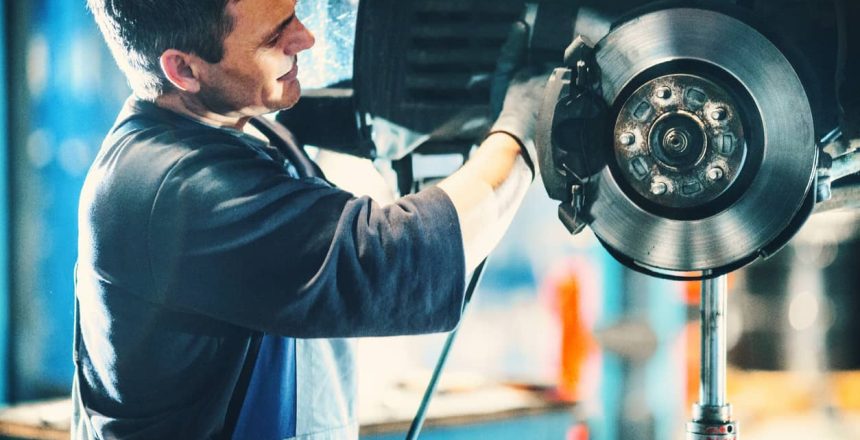Brake pads are a crucial component of any vehicle, and there are some clear indicators of when it’s time to replace them.
Vehicles require a ton of maintenance over their lifetimes, including oil changes, fluid top-ups, tune-ups, tire changeovers, and filter replacements. Some components will wear down over time and need replacing, too, such as your brake pads.
It’s vital to keep your car’s brakes in working order because they’re responsible for stopping the vehicle. The problem is that the braking system is actually a complex network of parts that come together to keep you safe.
Your brake pads are right in the thick of the action. They sit on the inside of the wheel’s calipers and apply friction to the rotors to slow and stop the vehicle. When brake pads wear out, they won’t create as much resistance, and the brakes won’t function at optimal levels.
As a result, keeping an eye on the state of your pads is essential because it can prevent significant problems and keep you safer whenever you operate your vehicle.
Here’s a look at five tell-tale signs it’s time for new brake pads for your vehicle.
Key Takeaways
- Your brake pads are an essential vehicle component
- You’ll need to maintain and replace them periodically
- There are some clear signs your brake pads need attention
- Conducting regular car maintenance before shipping is advisable
1. You feel vibrations
One of the first signs you might notice when your brake pads wear down is a vibration whenever you press on the brake pedal.
Your brake pads contain a resin that binds their various parts together. When the pads wear down, this adhesive comes into contact with the rotor, causing the resin to heat up, melt, and spread onto the rotor.
Ideally, this adhesive will spread evenly, and you won’t even notice that it’s melting. But this isn’t always the case. A resin that spreads unevenly will cause vibrations when you press the brakes because it creates an irregular surface on the rotor.
This scenario could mean you need new brake pads to alleviate the problem. If you address it early enough, though, there’s also a chance that some basic maintenance can save your brake pads.
2. There’s a grinding noise
In situations where you’re driving along and hear a grinding or growling sound when you apply your brakes, it could mean new brakes pads are necessary. It could also signal that your brake pads have so much wear that they’ve damaged the rotors, which is a more significant repair.
The grinding noise is usually the sound of metal contacting metal. In this case, it means your calipers are making contact with your rotors because your brake pads are nearly gone.
It’s impossible to miss this grinding sound, so keep an ear out as you drive and get to a mechanic right away if you notice it.
3. You hear squealing
If you notice a squealing sound while you’re driving that goes away when you apply the brakes, it could signal an issue with your brake pads.
This noise originates from a built-in safety feature in new brake pads that notifies you that your pads are eroding to dangerous levels. It comes from a metal tab located near the top of the brake pad that scrapes the rotor to warn the driver of the problem.
A squealing sound that disappears whenever you push on your brakes is a sure sign you need a mechanic to inspect your brakes to diagnose and repair the issue.
4. The car doesn’t stop as quickly
In some cases, your vehicle won’t stop as quickly when applying the brake when it’s time for new brake pads. This issue is called brake fade, and it’s often the result of continually using the brakes over long distances without coming to a complete stop.
Think about how you apply the brakes when coming down a hill. You’re using your brakes but aren’t stopping the vehicle. This action is incredibly hard on your brake pads and can cause premature wear because it makes your brake pads and rotors contact each other over long periods. When this happens, both components heat up, and the pads eventually lose their ability to generate friction as they wear down.
You’ll notice that your brakes aren’t as responsive in this situation, so you’ll want to have a technician have a look to see if brake fade is causing your issues.
5. The vehicle pulls to one side when braking
Your brake pads won’t wear evenly on both sides of the car, as one side is sure to thin out before the other. When this occurs, you could feel the car pulling in either direction as you brake.
This scenario can cause issues because it strains other vehicle components, like the steering knuckles, ball joints, wheel bearings, and the steering rack. These can all potentially lead to significant repairs down the line.
Keep in mind that worn brake pads aren’t the only problem that can cause your car to pull. It could also mean you have a faulty wheel bearing, uneven tire pressure, or an issue with the brake calipers.
It’s best to take your vehicle to a certified mechanic to diagnose why it is pulling to one side while you brake to ensure you take the proper steps to repair it.
Shipping your car
It’s a good idea to check your brake pads and other vehicle components before hiring a car transport carrier to ensure it’s in drivable condition upon arrival. That last thing you want to do is ship your vehicle a long distance only to realize you need a mechanic to install new brake pads before you can safely use it.
Mercury Auto Transport is a car shipping broker that can assist as you move your vehicle from point A to point B. We’ll provide you with quotes from FMCSA licensed and insured carriers, allowing you to select the option that best suits your needs. Contact Mercury Auto Transport today to receive your free vehicle shipping quote.






